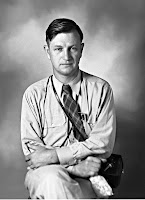 |
| Russell Lee 1942 |
Russell Lee traveled around the country during the Great Depression capturing what would become iconic documentation of those affected by the times. His travels included pictures of cowboys and families in the American West.
Russell Lee was born in 1903 in Ottowa, Illinois. He attended Lehigh University in Bethlehem, Pennsylvania and earned a degree in chemical engineering, but his heart was in his painting. He became interested in photography initially as a way to improve his painting, but he soon realized that his calling was in photography.
In 1936, the Farm Security Administration, or FSA, hired Lee to take photographs with a group that included Dorothea Lange. Lee traveled around the country, including San Augustine, Texas and Pie Town, New Mexico.
His photographs "were supposed to convince critics of the New Deal that conditions were so bad that government aid was absolutely necessary." (https://www.texasmonthly.com/articles/making-the-best-of-it/)
 |
| Home of Farmer, Wheelock, North Dakota, 1937 |
Lee said that they researched the area and talked to the people before he photographed them. "We wanted to do good reporting," Lee told Texas Monthly years later in an interview.
Lee's photography usually features real life situations, people of poverty in their day to day lives during the Great Depression. Even though he often shows the direst of environments, Lee's subjects often seem resigned, or during celebratory times, even content. At other times, his subjects stare unflinchingly at the camera with a palpable sadness or a stoic resignation.
 |
| Sharecroppers in Missouri |
 |
| Migrant farmer and daughter near Harlingen, Texas |
 |
| Little Girls Getting Tickets for the Merry-go-round at the Carnival on the Fourth of July, Vale, Oregon, 1941 |
After the FSA disbanded in 1943, Lee worked for the Air Transport Command. He then worked for the U.S. Department of the Interior, taking pictures of coal mining communities. Lee also documented the forced relocation of the Japanese Americans to internment camps.
 |
| Tagged for evacuation, Salinas, California 1942 |
In 1947, he moved to Austin, Texas where he eventually became
the first photography instructor at the University of Texas in 1965. Russell Lee
died in 1986. Lee's legacy is documenting some of the hardest times in our country with realism and compassion.
 |
| Yarborough campaign onlookers, Mount Vernon, Texas. |
 |
| Street Scene, San Augustine, Texas 1939 |
 |
| Shack in Granger, Texas |
 |
| Daughter of Pomp Hall Preparing Peas for Supper, Oklahoma, 1940. |
 |
| Cowboys Drinking Beers Alpine, Texas 1939 |
 |
| Farmer Buying Seeds in a Store, San Augustine, Texas, 1939 |
|
 |
| Mexican Girls Carrot Workers Edinburgh, Texas 1939 |
Further Reading:
http://www.howardgreenberg.com/artists/russell-lee
https://www.texasmonthly.com/articles/making-the-best-of-it/
https://thislandpress.com/2014/10/16/hard-times-oklahoma-a-russell-lee-photo-essay/
Library of Congress: Many Photographs of Russell Lee's















I remember seeing photos by Dorothea Lange but hadn't heard of Russell Lee. Thank you for an interesting and educational post.
ReplyDeleteYes, they had a very similar style and the same mission during the Great Depression. Thank you for your comment.
DeleteEnjoyed the pictures. Thank you.
ReplyDeleteThank you. I love looking at his pictures and tried to choose a variety of them.
DeleteIt's wonderful to have such a plethora of pictures of the Great Depression so that later generations have an understanding of what their parents or grandparents went through. It also gives us hope to survive any current situation. Life goes on but the scars remain. Thank you for this article.
ReplyDeleteThank you for your comments. I think it's important that these photos exist for the same reason.
Delete